An Analysis of the Implications of IRFS on Accounting Quality
VerifiedAdded on 2021/05/30
|13
|3408
|25
Report
AI Summary
This report examines the implications of the International Financial Reporting Standards (IRFS) on accounting quality, focusing on its impact on financial reporting, comparability, and the role of accountants. It explores how IRFS has influenced value relevance, earnings management, accrual reliability, and financial statement readability. The report highlights the benefits and challenges of IRFS adoption, including its effects on intangible assets, deferred taxes, and the composition of audit committees. It also analyzes the impact on Australian firms, particularly those under the AASB, and discusses the importance of voluntary adoption for achieving optimal results. The analysis covers key areas such as accounting quality, financial statement comparability, and the relationship with investors and financial analysts, offering insights into the practical consequences of IRFS implementation.
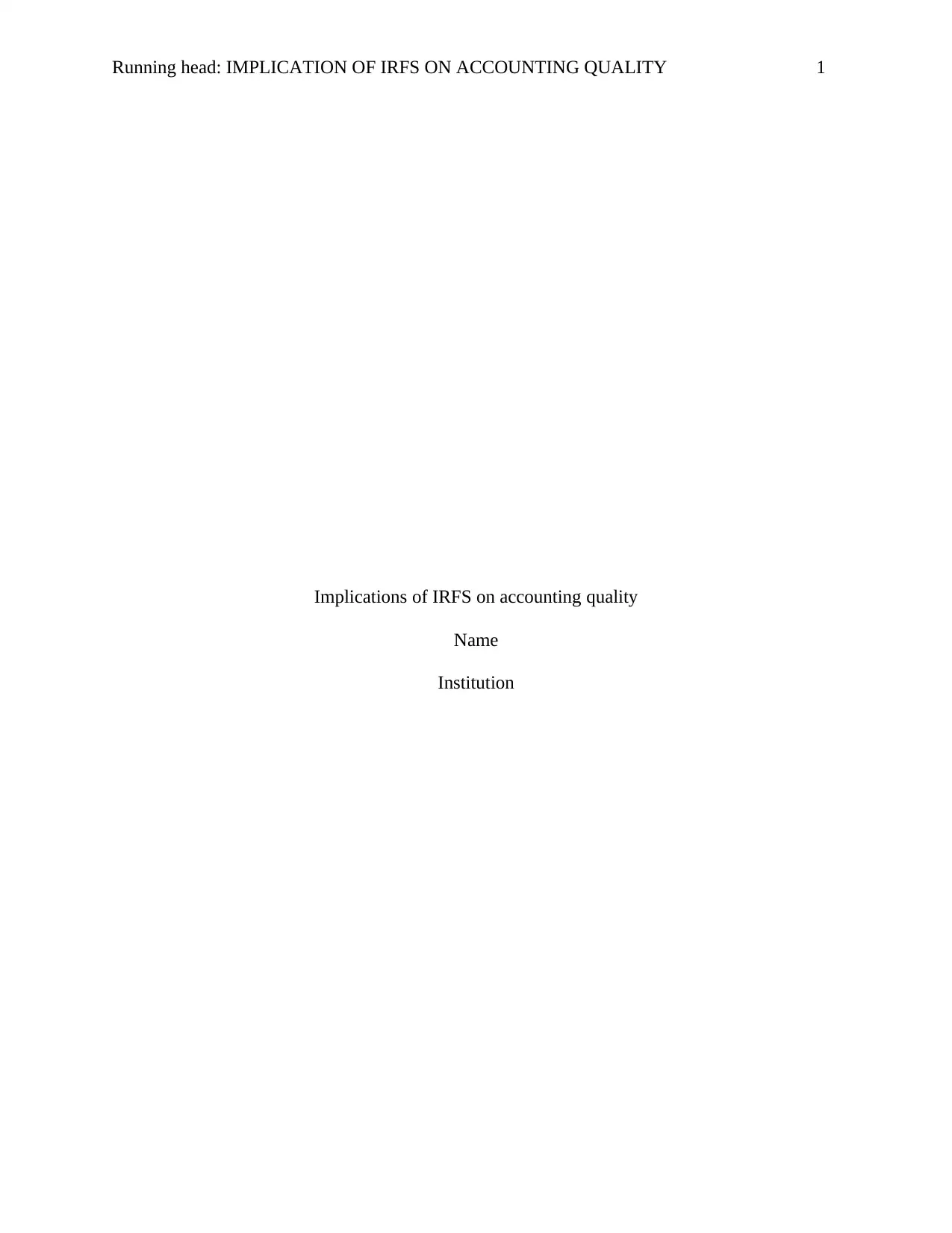
Running head: IMPLICATION OF IRFS ON ACCOUNTING QUALITY 1
Implications of IRFS on accounting quality
Name
Institution
Implications of IRFS on accounting quality
Name
Institution
Paraphrase This Document
Need a fresh take? Get an instant paraphrase of this document with our AI Paraphraser
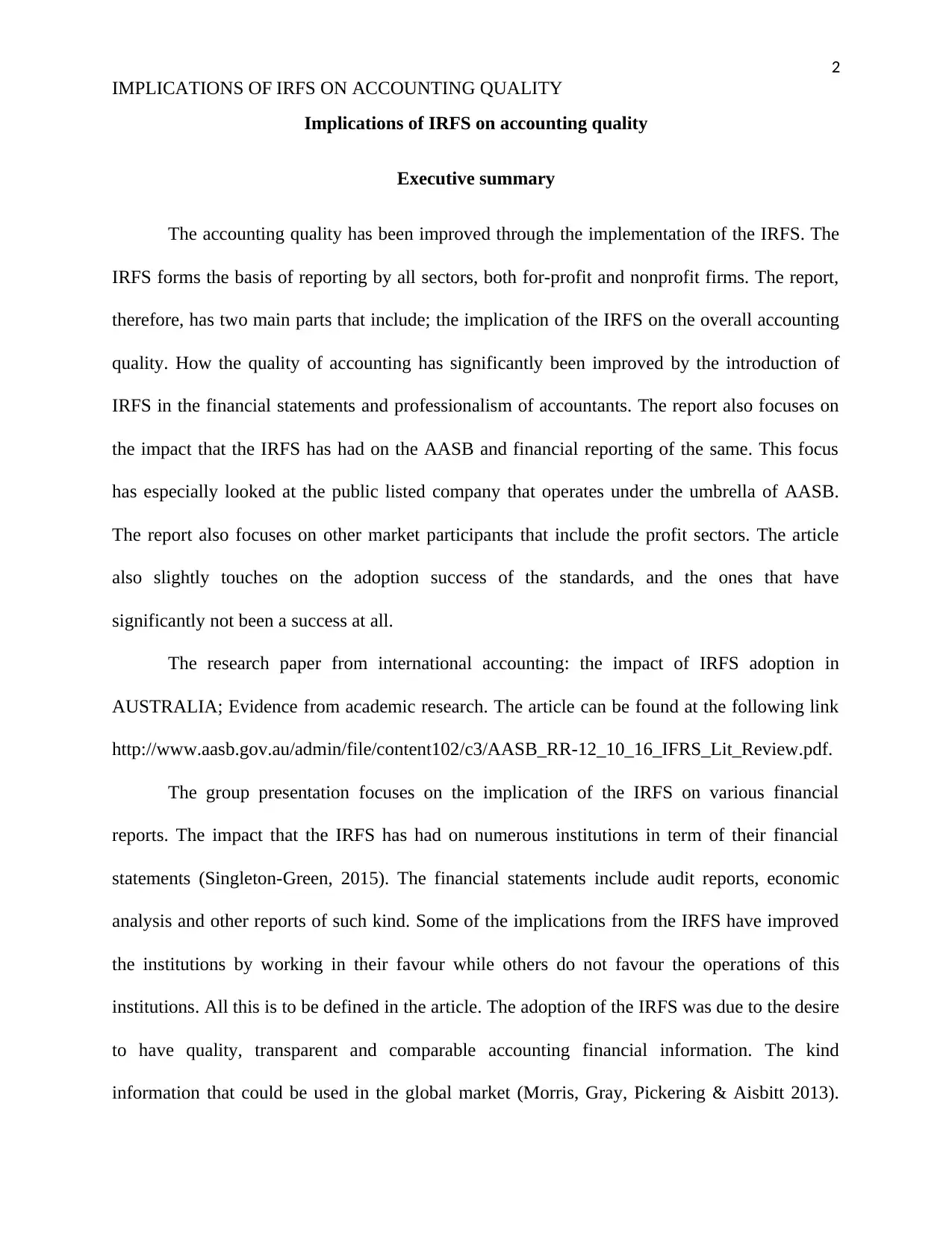
2
IMPLICATIONS OF IRFS ON ACCOUNTING QUALITY
Implications of IRFS on accounting quality
Executive summary
The accounting quality has been improved through the implementation of the IRFS. The
IRFS forms the basis of reporting by all sectors, both for-profit and nonprofit firms. The report,
therefore, has two main parts that include; the implication of the IRFS on the overall accounting
quality. How the quality of accounting has significantly been improved by the introduction of
IRFS in the financial statements and professionalism of accountants. The report also focuses on
the impact that the IRFS has had on the AASB and financial reporting of the same. This focus
has especially looked at the public listed company that operates under the umbrella of AASB.
The report also focuses on other market participants that include the profit sectors. The article
also slightly touches on the adoption success of the standards, and the ones that have
significantly not been a success at all.
The research paper from international accounting: the impact of IRFS adoption in
AUSTRALIA; Evidence from academic research. The article can be found at the following link
http://www.aasb.gov.au/admin/file/content102/c3/AASB_RR-12_10_16_IFRS_Lit_Review.pdf.
The group presentation focuses on the implication of the IRFS on various financial
reports. The impact that the IRFS has had on numerous institutions in term of their financial
statements (Singleton-Green, 2015). The financial statements include audit reports, economic
analysis and other reports of such kind. Some of the implications from the IRFS have improved
the institutions by working in their favour while others do not favour the operations of this
institutions. All this is to be defined in the article. The adoption of the IRFS was due to the desire
to have quality, transparent and comparable accounting financial information. The kind
information that could be used in the global market (Morris, Gray, Pickering & Aisbitt 2013).
IMPLICATIONS OF IRFS ON ACCOUNTING QUALITY
Implications of IRFS on accounting quality
Executive summary
The accounting quality has been improved through the implementation of the IRFS. The
IRFS forms the basis of reporting by all sectors, both for-profit and nonprofit firms. The report,
therefore, has two main parts that include; the implication of the IRFS on the overall accounting
quality. How the quality of accounting has significantly been improved by the introduction of
IRFS in the financial statements and professionalism of accountants. The report also focuses on
the impact that the IRFS has had on the AASB and financial reporting of the same. This focus
has especially looked at the public listed company that operates under the umbrella of AASB.
The report also focuses on other market participants that include the profit sectors. The article
also slightly touches on the adoption success of the standards, and the ones that have
significantly not been a success at all.
The research paper from international accounting: the impact of IRFS adoption in
AUSTRALIA; Evidence from academic research. The article can be found at the following link
http://www.aasb.gov.au/admin/file/content102/c3/AASB_RR-12_10_16_IFRS_Lit_Review.pdf.
The group presentation focuses on the implication of the IRFS on various financial
reports. The impact that the IRFS has had on numerous institutions in term of their financial
statements (Singleton-Green, 2015). The financial statements include audit reports, economic
analysis and other reports of such kind. Some of the implications from the IRFS have improved
the institutions by working in their favour while others do not favour the operations of this
institutions. All this is to be defined in the article. The adoption of the IRFS was due to the desire
to have quality, transparent and comparable accounting financial information. The kind
information that could be used in the global market (Morris, Gray, Pickering & Aisbitt 2013).
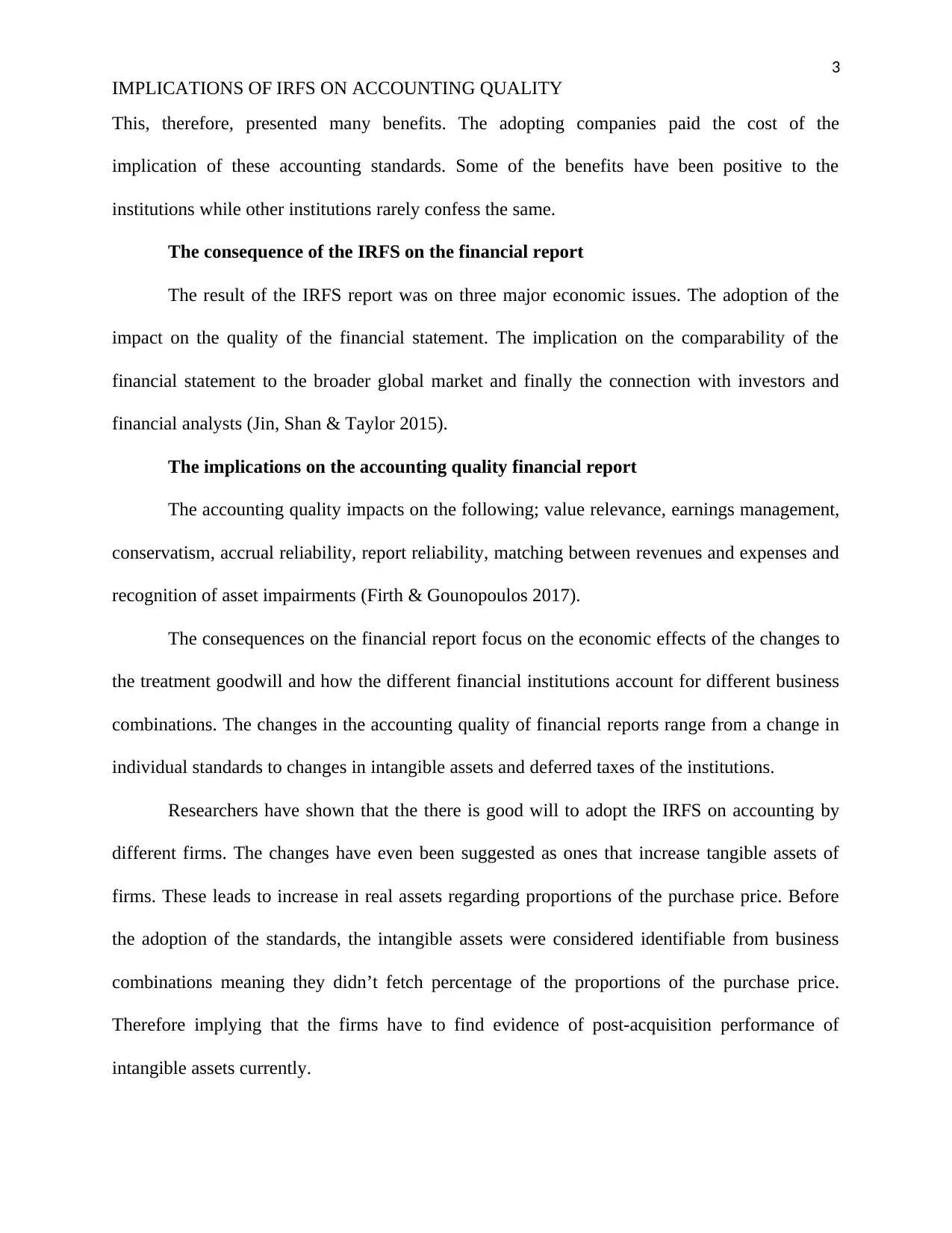
3
IMPLICATIONS OF IRFS ON ACCOUNTING QUALITY
This, therefore, presented many benefits. The adopting companies paid the cost of the
implication of these accounting standards. Some of the benefits have been positive to the
institutions while other institutions rarely confess the same.
The consequence of the IRFS on the financial report
The result of the IRFS report was on three major economic issues. The adoption of the
impact on the quality of the financial statement. The implication on the comparability of the
financial statement to the broader global market and finally the connection with investors and
financial analysts (Jin, Shan & Taylor 2015).
The implications on the accounting quality financial report
The accounting quality impacts on the following; value relevance, earnings management,
conservatism, accrual reliability, report reliability, matching between revenues and expenses and
recognition of asset impairments (Firth & Gounopoulos 2017).
The consequences on the financial report focus on the economic effects of the changes to
the treatment goodwill and how the different financial institutions account for different business
combinations. The changes in the accounting quality of financial reports range from a change in
individual standards to changes in intangible assets and deferred taxes of the institutions.
Researchers have shown that the there is good will to adopt the IRFS on accounting by
different firms. The changes have even been suggested as ones that increase tangible assets of
firms. These leads to increase in real assets regarding proportions of the purchase price. Before
the adoption of the standards, the intangible assets were considered identifiable from business
combinations meaning they didn’t fetch percentage of the proportions of the purchase price.
Therefore implying that the firms have to find evidence of post-acquisition performance of
intangible assets currently.
IMPLICATIONS OF IRFS ON ACCOUNTING QUALITY
This, therefore, presented many benefits. The adopting companies paid the cost of the
implication of these accounting standards. Some of the benefits have been positive to the
institutions while other institutions rarely confess the same.
The consequence of the IRFS on the financial report
The result of the IRFS report was on three major economic issues. The adoption of the
impact on the quality of the financial statement. The implication on the comparability of the
financial statement to the broader global market and finally the connection with investors and
financial analysts (Jin, Shan & Taylor 2015).
The implications on the accounting quality financial report
The accounting quality impacts on the following; value relevance, earnings management,
conservatism, accrual reliability, report reliability, matching between revenues and expenses and
recognition of asset impairments (Firth & Gounopoulos 2017).
The consequences on the financial report focus on the economic effects of the changes to
the treatment goodwill and how the different financial institutions account for different business
combinations. The changes in the accounting quality of financial reports range from a change in
individual standards to changes in intangible assets and deferred taxes of the institutions.
Researchers have shown that the there is good will to adopt the IRFS on accounting by
different firms. The changes have even been suggested as ones that increase tangible assets of
firms. These leads to increase in real assets regarding proportions of the purchase price. Before
the adoption of the standards, the intangible assets were considered identifiable from business
combinations meaning they didn’t fetch percentage of the proportions of the purchase price.
Therefore implying that the firms have to find evidence of post-acquisition performance of
intangible assets currently.
⊘ This is a preview!⊘
Do you want full access?
Subscribe today to unlock all pages.

Trusted by 1+ million students worldwide
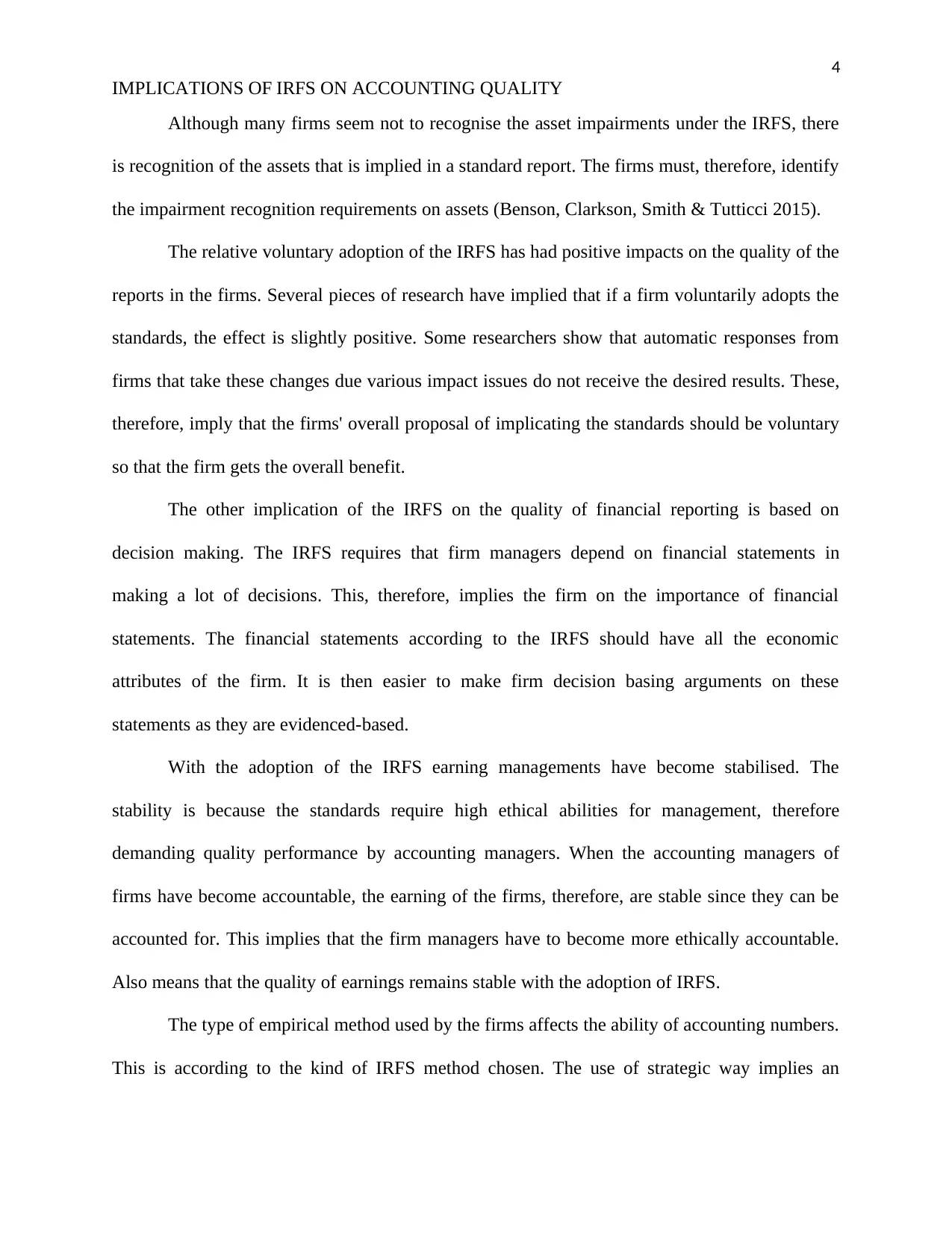
4
IMPLICATIONS OF IRFS ON ACCOUNTING QUALITY
Although many firms seem not to recognise the asset impairments under the IRFS, there
is recognition of the assets that is implied in a standard report. The firms must, therefore, identify
the impairment recognition requirements on assets (Benson, Clarkson, Smith & Tutticci 2015).
The relative voluntary adoption of the IRFS has had positive impacts on the quality of the
reports in the firms. Several pieces of research have implied that if a firm voluntarily adopts the
standards, the effect is slightly positive. Some researchers show that automatic responses from
firms that take these changes due various impact issues do not receive the desired results. These,
therefore, imply that the firms' overall proposal of implicating the standards should be voluntary
so that the firm gets the overall benefit.
The other implication of the IRFS on the quality of financial reporting is based on
decision making. The IRFS requires that firm managers depend on financial statements in
making a lot of decisions. This, therefore, implies the firm on the importance of financial
statements. The financial statements according to the IRFS should have all the economic
attributes of the firm. It is then easier to make firm decision basing arguments on these
statements as they are evidenced-based.
With the adoption of the IRFS earning managements have become stabilised. The
stability is because the standards require high ethical abilities for management, therefore
demanding quality performance by accounting managers. When the accounting managers of
firms have become accountable, the earning of the firms, therefore, are stable since they can be
accounted for. This implies that the firm managers have to become more ethically accountable.
Also means that the quality of earnings remains stable with the adoption of IRFS.
The type of empirical method used by the firms affects the ability of accounting numbers.
This is according to the kind of IRFS method chosen. The use of strategic way implies an
IMPLICATIONS OF IRFS ON ACCOUNTING QUALITY
Although many firms seem not to recognise the asset impairments under the IRFS, there
is recognition of the assets that is implied in a standard report. The firms must, therefore, identify
the impairment recognition requirements on assets (Benson, Clarkson, Smith & Tutticci 2015).
The relative voluntary adoption of the IRFS has had positive impacts on the quality of the
reports in the firms. Several pieces of research have implied that if a firm voluntarily adopts the
standards, the effect is slightly positive. Some researchers show that automatic responses from
firms that take these changes due various impact issues do not receive the desired results. These,
therefore, imply that the firms' overall proposal of implicating the standards should be voluntary
so that the firm gets the overall benefit.
The other implication of the IRFS on the quality of financial reporting is based on
decision making. The IRFS requires that firm managers depend on financial statements in
making a lot of decisions. This, therefore, implies the firm on the importance of financial
statements. The financial statements according to the IRFS should have all the economic
attributes of the firm. It is then easier to make firm decision basing arguments on these
statements as they are evidenced-based.
With the adoption of the IRFS earning managements have become stabilised. The
stability is because the standards require high ethical abilities for management, therefore
demanding quality performance by accounting managers. When the accounting managers of
firms have become accountable, the earning of the firms, therefore, are stable since they can be
accounted for. This implies that the firm managers have to become more ethically accountable.
Also means that the quality of earnings remains stable with the adoption of IRFS.
The type of empirical method used by the firms affects the ability of accounting numbers.
This is according to the kind of IRFS method chosen. The use of strategic way implies an
Paraphrase This Document
Need a fresh take? Get an instant paraphrase of this document with our AI Paraphraser
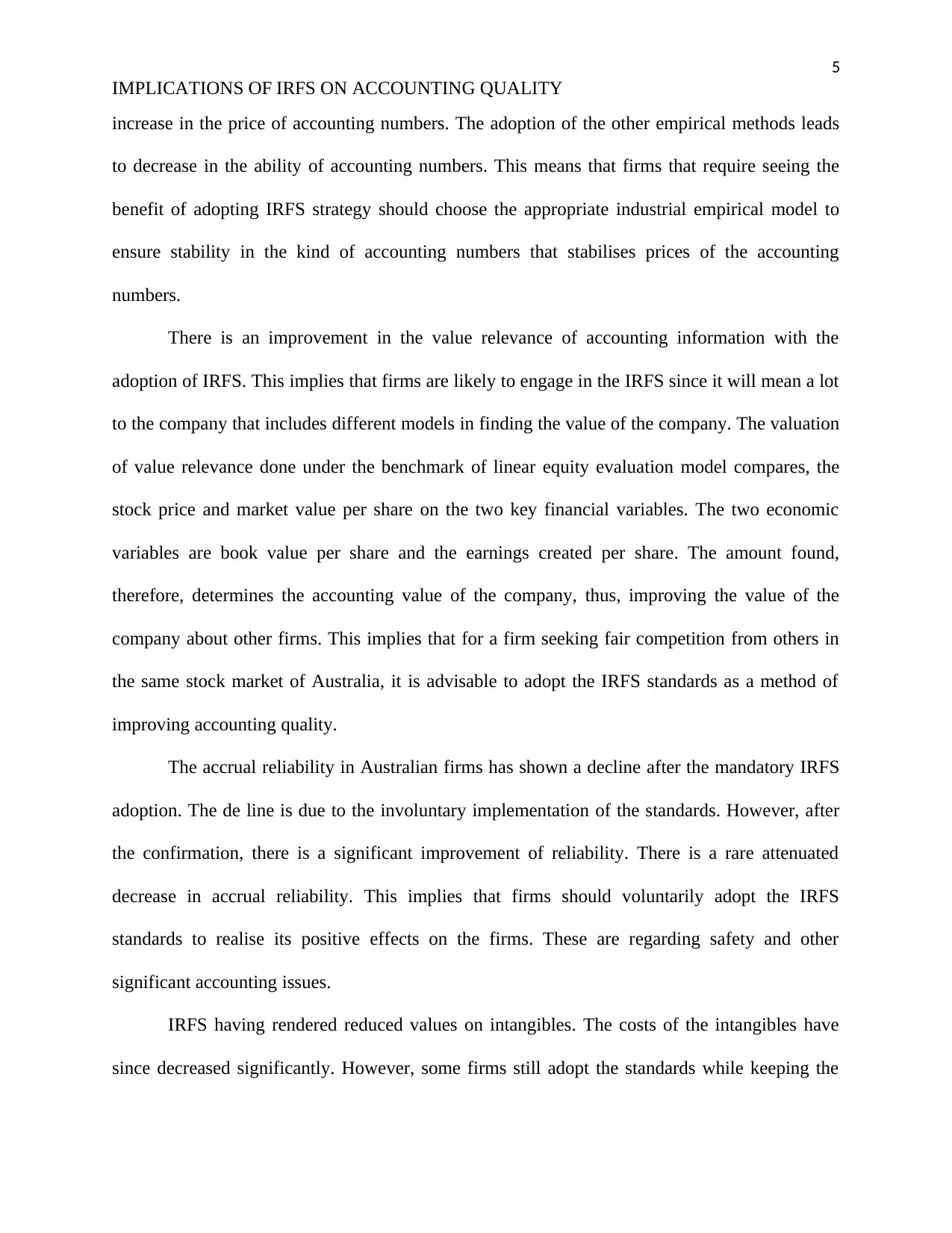
5
IMPLICATIONS OF IRFS ON ACCOUNTING QUALITY
increase in the price of accounting numbers. The adoption of the other empirical methods leads
to decrease in the ability of accounting numbers. This means that firms that require seeing the
benefit of adopting IRFS strategy should choose the appropriate industrial empirical model to
ensure stability in the kind of accounting numbers that stabilises prices of the accounting
numbers.
There is an improvement in the value relevance of accounting information with the
adoption of IRFS. This implies that firms are likely to engage in the IRFS since it will mean a lot
to the company that includes different models in finding the value of the company. The valuation
of value relevance done under the benchmark of linear equity evaluation model compares, the
stock price and market value per share on the two key financial variables. The two economic
variables are book value per share and the earnings created per share. The amount found,
therefore, determines the accounting value of the company, thus, improving the value of the
company about other firms. This implies that for a firm seeking fair competition from others in
the same stock market of Australia, it is advisable to adopt the IRFS standards as a method of
improving accounting quality.
The accrual reliability in Australian firms has shown a decline after the mandatory IRFS
adoption. The de line is due to the involuntary implementation of the standards. However, after
the confirmation, there is a significant improvement of reliability. There is a rare attenuated
decrease in accrual reliability. This implies that firms should voluntarily adopt the IRFS
standards to realise its positive effects on the firms. These are regarding safety and other
significant accounting issues.
IRFS having rendered reduced values on intangibles. The costs of the intangibles have
since decreased significantly. However, some firms still adopt the standards while keeping the
IMPLICATIONS OF IRFS ON ACCOUNTING QUALITY
increase in the price of accounting numbers. The adoption of the other empirical methods leads
to decrease in the ability of accounting numbers. This means that firms that require seeing the
benefit of adopting IRFS strategy should choose the appropriate industrial empirical model to
ensure stability in the kind of accounting numbers that stabilises prices of the accounting
numbers.
There is an improvement in the value relevance of accounting information with the
adoption of IRFS. This implies that firms are likely to engage in the IRFS since it will mean a lot
to the company that includes different models in finding the value of the company. The valuation
of value relevance done under the benchmark of linear equity evaluation model compares, the
stock price and market value per share on the two key financial variables. The two economic
variables are book value per share and the earnings created per share. The amount found,
therefore, determines the accounting value of the company, thus, improving the value of the
company about other firms. This implies that for a firm seeking fair competition from others in
the same stock market of Australia, it is advisable to adopt the IRFS standards as a method of
improving accounting quality.
The accrual reliability in Australian firms has shown a decline after the mandatory IRFS
adoption. The de line is due to the involuntary implementation of the standards. However, after
the confirmation, there is a significant improvement of reliability. There is a rare attenuated
decrease in accrual reliability. This implies that firms should voluntarily adopt the IRFS
standards to realise its positive effects on the firms. These are regarding safety and other
significant accounting issues.
IRFS having rendered reduced values on intangibles. The costs of the intangibles have
since decreased significantly. However, some firms still adopt the standards while keeping the
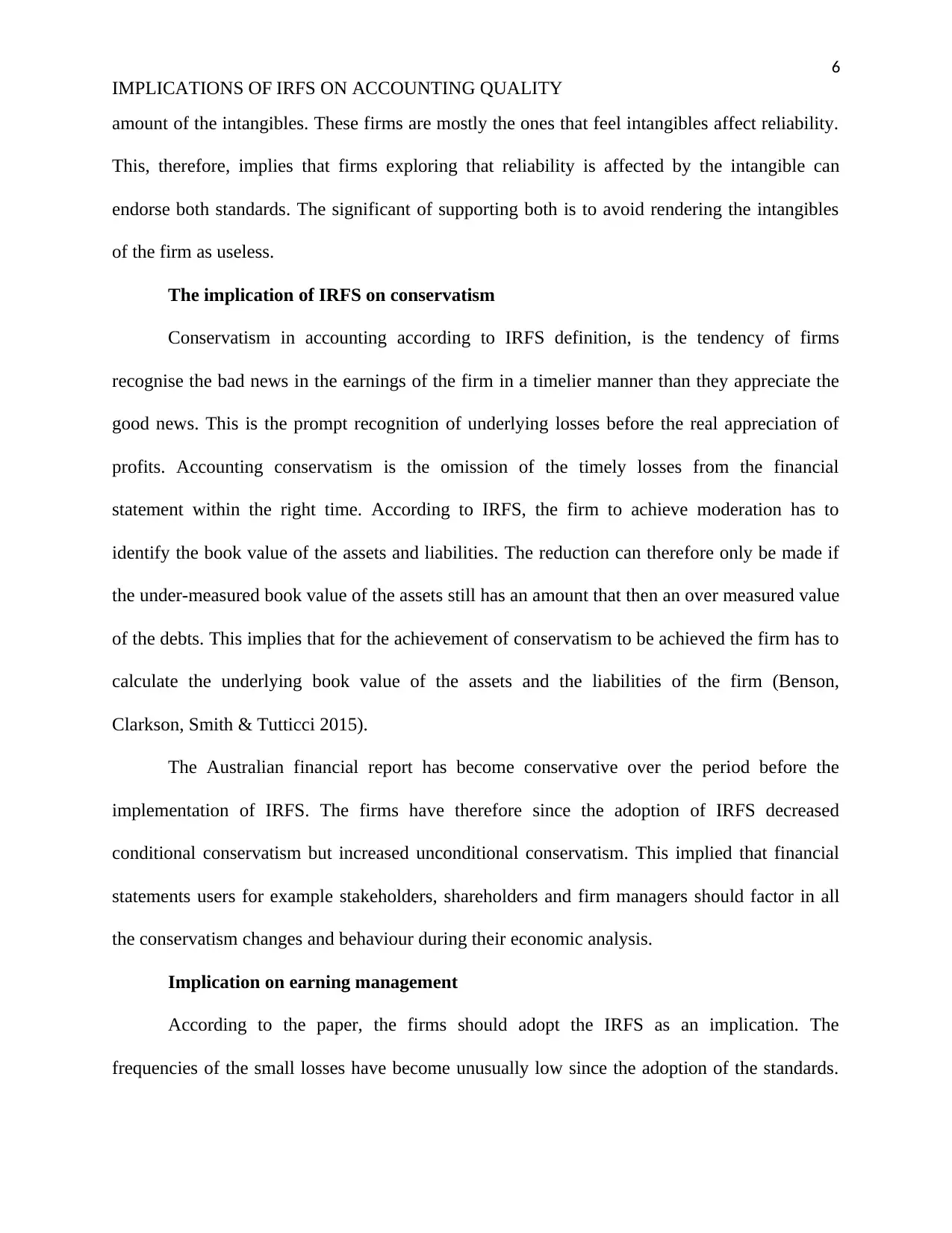
6
IMPLICATIONS OF IRFS ON ACCOUNTING QUALITY
amount of the intangibles. These firms are mostly the ones that feel intangibles affect reliability.
This, therefore, implies that firms exploring that reliability is affected by the intangible can
endorse both standards. The significant of supporting both is to avoid rendering the intangibles
of the firm as useless.
The implication of IRFS on conservatism
Conservatism in accounting according to IRFS definition, is the tendency of firms
recognise the bad news in the earnings of the firm in a timelier manner than they appreciate the
good news. This is the prompt recognition of underlying losses before the real appreciation of
profits. Accounting conservatism is the omission of the timely losses from the financial
statement within the right time. According to IRFS, the firm to achieve moderation has to
identify the book value of the assets and liabilities. The reduction can therefore only be made if
the under-measured book value of the assets still has an amount that then an over measured value
of the debts. This implies that for the achievement of conservatism to be achieved the firm has to
calculate the underlying book value of the assets and the liabilities of the firm (Benson,
Clarkson, Smith & Tutticci 2015).
The Australian financial report has become conservative over the period before the
implementation of IRFS. The firms have therefore since the adoption of IRFS decreased
conditional conservatism but increased unconditional conservatism. This implied that financial
statements users for example stakeholders, shareholders and firm managers should factor in all
the conservatism changes and behaviour during their economic analysis.
Implication on earning management
According to the paper, the firms should adopt the IRFS as an implication. The
frequencies of the small losses have become unusually low since the adoption of the standards.
IMPLICATIONS OF IRFS ON ACCOUNTING QUALITY
amount of the intangibles. These firms are mostly the ones that feel intangibles affect reliability.
This, therefore, implies that firms exploring that reliability is affected by the intangible can
endorse both standards. The significant of supporting both is to avoid rendering the intangibles
of the firm as useless.
The implication of IRFS on conservatism
Conservatism in accounting according to IRFS definition, is the tendency of firms
recognise the bad news in the earnings of the firm in a timelier manner than they appreciate the
good news. This is the prompt recognition of underlying losses before the real appreciation of
profits. Accounting conservatism is the omission of the timely losses from the financial
statement within the right time. According to IRFS, the firm to achieve moderation has to
identify the book value of the assets and liabilities. The reduction can therefore only be made if
the under-measured book value of the assets still has an amount that then an over measured value
of the debts. This implies that for the achievement of conservatism to be achieved the firm has to
calculate the underlying book value of the assets and the liabilities of the firm (Benson,
Clarkson, Smith & Tutticci 2015).
The Australian financial report has become conservative over the period before the
implementation of IRFS. The firms have therefore since the adoption of IRFS decreased
conditional conservatism but increased unconditional conservatism. This implied that financial
statements users for example stakeholders, shareholders and firm managers should factor in all
the conservatism changes and behaviour during their economic analysis.
Implication on earning management
According to the paper, the firms should adopt the IRFS as an implication. The
frequencies of the small losses have become unusually low since the adoption of the standards.
⊘ This is a preview!⊘
Do you want full access?
Subscribe today to unlock all pages.

Trusted by 1+ million students worldwide
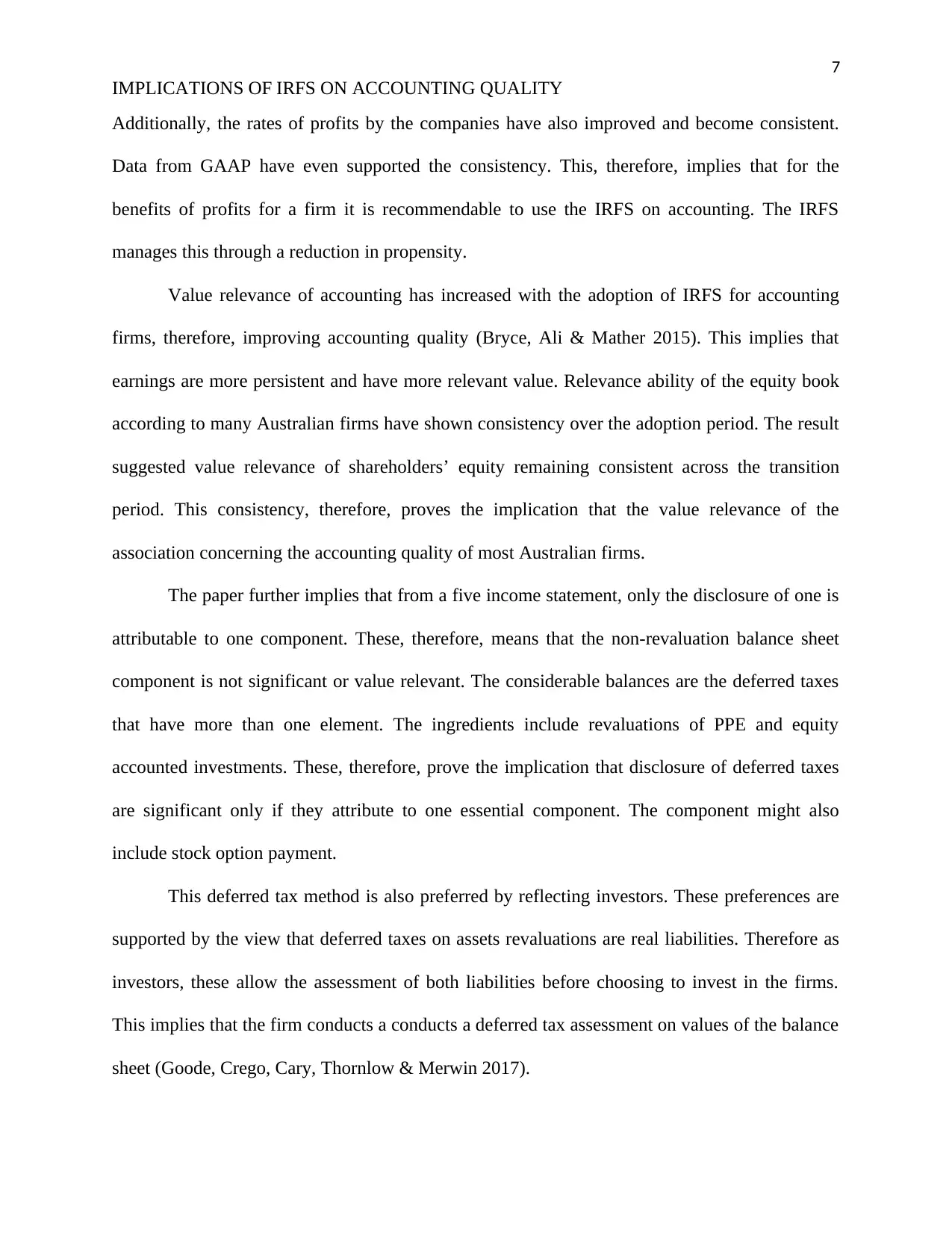
7
IMPLICATIONS OF IRFS ON ACCOUNTING QUALITY
Additionally, the rates of profits by the companies have also improved and become consistent.
Data from GAAP have even supported the consistency. This, therefore, implies that for the
benefits of profits for a firm it is recommendable to use the IRFS on accounting. The IRFS
manages this through a reduction in propensity.
Value relevance of accounting has increased with the adoption of IRFS for accounting
firms, therefore, improving accounting quality (Bryce, Ali & Mather 2015). This implies that
earnings are more persistent and have more relevant value. Relevance ability of the equity book
according to many Australian firms have shown consistency over the adoption period. The result
suggested value relevance of shareholders’ equity remaining consistent across the transition
period. This consistency, therefore, proves the implication that the value relevance of the
association concerning the accounting quality of most Australian firms.
The paper further implies that from a five income statement, only the disclosure of one is
attributable to one component. These, therefore, means that the non-revaluation balance sheet
component is not significant or value relevant. The considerable balances are the deferred taxes
that have more than one element. The ingredients include revaluations of PPE and equity
accounted investments. These, therefore, prove the implication that disclosure of deferred taxes
are significant only if they attribute to one essential component. The component might also
include stock option payment.
This deferred tax method is also preferred by reflecting investors. These preferences are
supported by the view that deferred taxes on assets revaluations are real liabilities. Therefore as
investors, these allow the assessment of both liabilities before choosing to invest in the firms.
This implies that the firm conducts a conducts a deferred tax assessment on values of the balance
sheet (Goode, Crego, Cary, Thornlow & Merwin 2017).
IMPLICATIONS OF IRFS ON ACCOUNTING QUALITY
Additionally, the rates of profits by the companies have also improved and become consistent.
Data from GAAP have even supported the consistency. This, therefore, implies that for the
benefits of profits for a firm it is recommendable to use the IRFS on accounting. The IRFS
manages this through a reduction in propensity.
Value relevance of accounting has increased with the adoption of IRFS for accounting
firms, therefore, improving accounting quality (Bryce, Ali & Mather 2015). This implies that
earnings are more persistent and have more relevant value. Relevance ability of the equity book
according to many Australian firms have shown consistency over the adoption period. The result
suggested value relevance of shareholders’ equity remaining consistent across the transition
period. This consistency, therefore, proves the implication that the value relevance of the
association concerning the accounting quality of most Australian firms.
The paper further implies that from a five income statement, only the disclosure of one is
attributable to one component. These, therefore, means that the non-revaluation balance sheet
component is not significant or value relevant. The considerable balances are the deferred taxes
that have more than one element. The ingredients include revaluations of PPE and equity
accounted investments. These, therefore, prove the implication that disclosure of deferred taxes
are significant only if they attribute to one essential component. The component might also
include stock option payment.
This deferred tax method is also preferred by reflecting investors. These preferences are
supported by the view that deferred taxes on assets revaluations are real liabilities. Therefore as
investors, these allow the assessment of both liabilities before choosing to invest in the firms.
This implies that the firm conducts a conducts a deferred tax assessment on values of the balance
sheet (Goode, Crego, Cary, Thornlow & Merwin 2017).
Paraphrase This Document
Need a fresh take? Get an instant paraphrase of this document with our AI Paraphraser
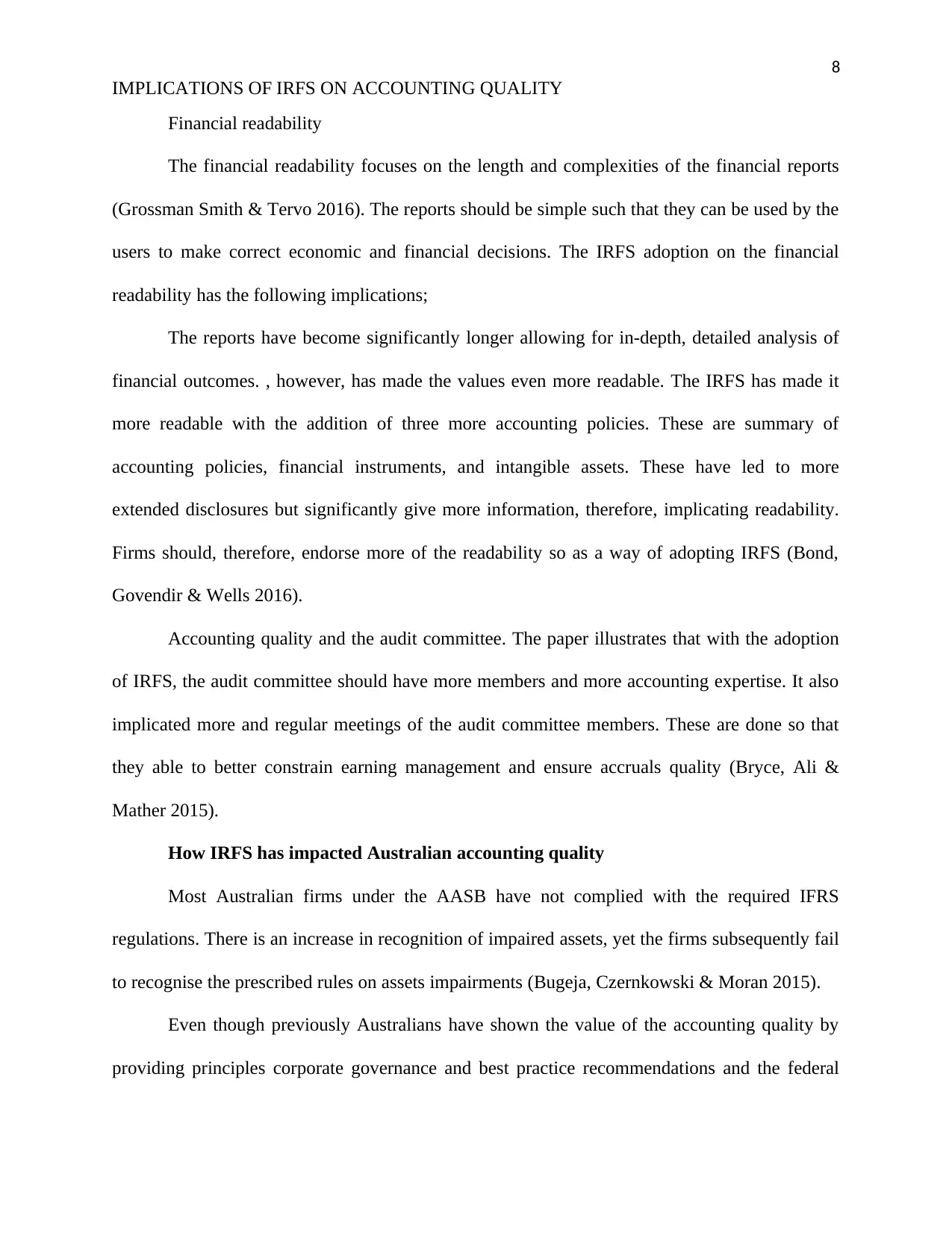
8
IMPLICATIONS OF IRFS ON ACCOUNTING QUALITY
Financial readability
The financial readability focuses on the length and complexities of the financial reports
(Grossman Smith & Tervo 2016). The reports should be simple such that they can be used by the
users to make correct economic and financial decisions. The IRFS adoption on the financial
readability has the following implications;
The reports have become significantly longer allowing for in-depth, detailed analysis of
financial outcomes. , however, has made the values even more readable. The IRFS has made it
more readable with the addition of three more accounting policies. These are summary of
accounting policies, financial instruments, and intangible assets. These have led to more
extended disclosures but significantly give more information, therefore, implicating readability.
Firms should, therefore, endorse more of the readability so as a way of adopting IRFS (Bond,
Govendir & Wells 2016).
Accounting quality and the audit committee. The paper illustrates that with the adoption
of IRFS, the audit committee should have more members and more accounting expertise. It also
implicated more and regular meetings of the audit committee members. These are done so that
they able to better constrain earning management and ensure accruals quality (Bryce, Ali &
Mather 2015).
How IRFS has impacted Australian accounting quality
Most Australian firms under the AASB have not complied with the required IFRS
regulations. There is an increase in recognition of impaired assets, yet the firms subsequently fail
to recognise the prescribed rules on assets impairments (Bugeja, Czernkowski & Moran 2015).
Even though previously Australians have shown the value of the accounting quality by
providing principles corporate governance and best practice recommendations and the federal
IMPLICATIONS OF IRFS ON ACCOUNTING QUALITY
Financial readability
The financial readability focuses on the length and complexities of the financial reports
(Grossman Smith & Tervo 2016). The reports should be simple such that they can be used by the
users to make correct economic and financial decisions. The IRFS adoption on the financial
readability has the following implications;
The reports have become significantly longer allowing for in-depth, detailed analysis of
financial outcomes. , however, has made the values even more readable. The IRFS has made it
more readable with the addition of three more accounting policies. These are summary of
accounting policies, financial instruments, and intangible assets. These have led to more
extended disclosures but significantly give more information, therefore, implicating readability.
Firms should, therefore, endorse more of the readability so as a way of adopting IRFS (Bond,
Govendir & Wells 2016).
Accounting quality and the audit committee. The paper illustrates that with the adoption
of IRFS, the audit committee should have more members and more accounting expertise. It also
implicated more and regular meetings of the audit committee members. These are done so that
they able to better constrain earning management and ensure accruals quality (Bryce, Ali &
Mather 2015).
How IRFS has impacted Australian accounting quality
Most Australian firms under the AASB have not complied with the required IFRS
regulations. There is an increase in recognition of impaired assets, yet the firms subsequently fail
to recognise the prescribed rules on assets impairments (Bugeja, Czernkowski & Moran 2015).
Even though previously Australians have shown the value of the accounting quality by
providing principles corporate governance and best practice recommendations and the federal
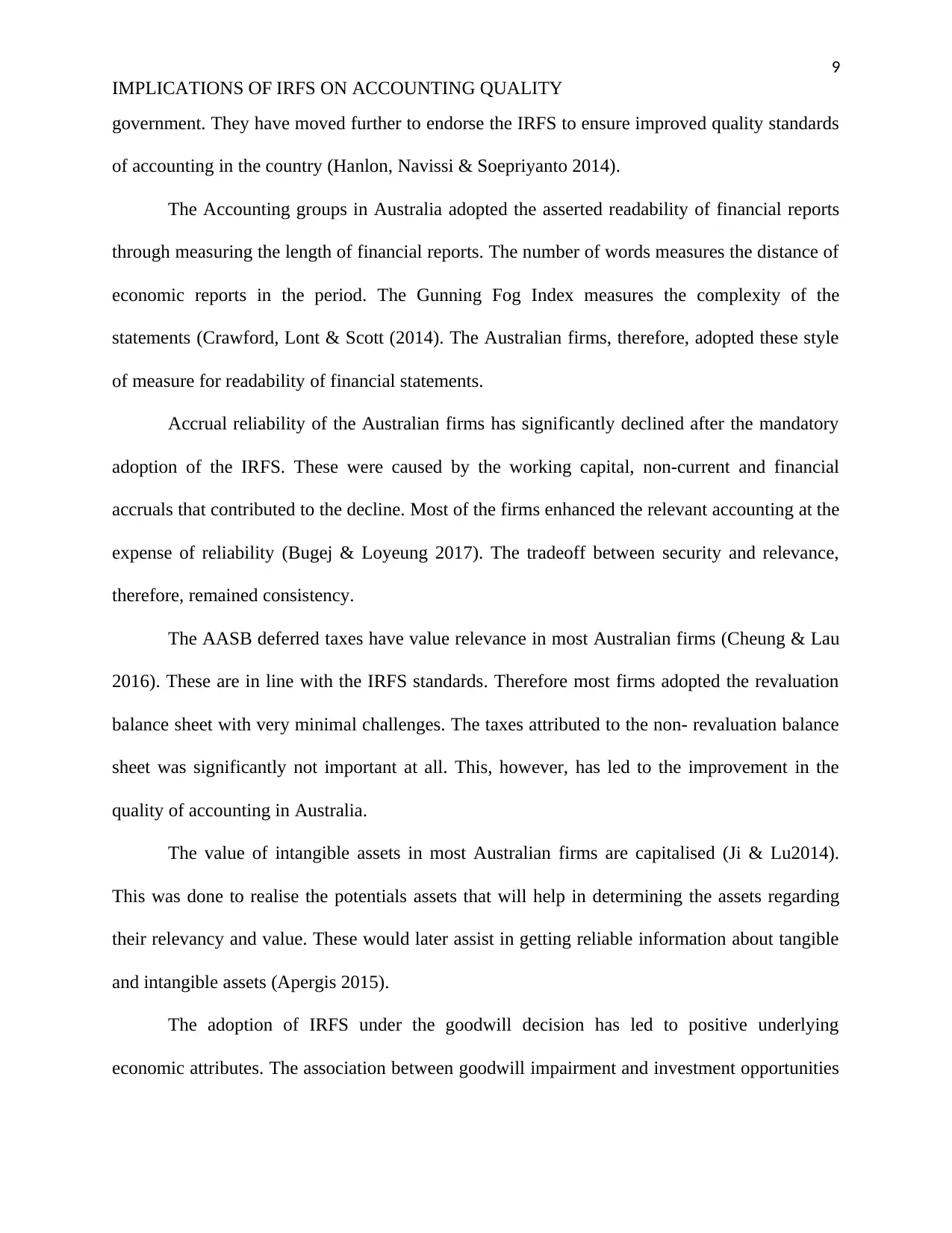
9
IMPLICATIONS OF IRFS ON ACCOUNTING QUALITY
government. They have moved further to endorse the IRFS to ensure improved quality standards
of accounting in the country (Hanlon, Navissi & Soepriyanto 2014).
The Accounting groups in Australia adopted the asserted readability of financial reports
through measuring the length of financial reports. The number of words measures the distance of
economic reports in the period. The Gunning Fog Index measures the complexity of the
statements (Crawford, Lont & Scott (2014). The Australian firms, therefore, adopted these style
of measure for readability of financial statements.
Accrual reliability of the Australian firms has significantly declined after the mandatory
adoption of the IRFS. These were caused by the working capital, non-current and financial
accruals that contributed to the decline. Most of the firms enhanced the relevant accounting at the
expense of reliability (Bugej & Loyeung 2017). The tradeoff between security and relevance,
therefore, remained consistency.
The AASB deferred taxes have value relevance in most Australian firms (Cheung & Lau
2016). These are in line with the IRFS standards. Therefore most firms adopted the revaluation
balance sheet with very minimal challenges. The taxes attributed to the non- revaluation balance
sheet was significantly not important at all. This, however, has led to the improvement in the
quality of accounting in Australia.
The value of intangible assets in most Australian firms are capitalised (Ji & Lu2014).
This was done to realise the potentials assets that will help in determining the assets regarding
their relevancy and value. These would later assist in getting reliable information about tangible
and intangible assets (Apergis 2015).
The adoption of IRFS under the goodwill decision has led to positive underlying
economic attributes. The association between goodwill impairment and investment opportunities
IMPLICATIONS OF IRFS ON ACCOUNTING QUALITY
government. They have moved further to endorse the IRFS to ensure improved quality standards
of accounting in the country (Hanlon, Navissi & Soepriyanto 2014).
The Accounting groups in Australia adopted the asserted readability of financial reports
through measuring the length of financial reports. The number of words measures the distance of
economic reports in the period. The Gunning Fog Index measures the complexity of the
statements (Crawford, Lont & Scott (2014). The Australian firms, therefore, adopted these style
of measure for readability of financial statements.
Accrual reliability of the Australian firms has significantly declined after the mandatory
adoption of the IRFS. These were caused by the working capital, non-current and financial
accruals that contributed to the decline. Most of the firms enhanced the relevant accounting at the
expense of reliability (Bugej & Loyeung 2017). The tradeoff between security and relevance,
therefore, remained consistency.
The AASB deferred taxes have value relevance in most Australian firms (Cheung & Lau
2016). These are in line with the IRFS standards. Therefore most firms adopted the revaluation
balance sheet with very minimal challenges. The taxes attributed to the non- revaluation balance
sheet was significantly not important at all. This, however, has led to the improvement in the
quality of accounting in Australia.
The value of intangible assets in most Australian firms are capitalised (Ji & Lu2014).
This was done to realise the potentials assets that will help in determining the assets regarding
their relevancy and value. These would later assist in getting reliable information about tangible
and intangible assets (Apergis 2015).
The adoption of IRFS under the goodwill decision has led to positive underlying
economic attributes. The association between goodwill impairment and investment opportunities
⊘ This is a preview!⊘
Do you want full access?
Subscribe today to unlock all pages.

Trusted by 1+ million students worldwide
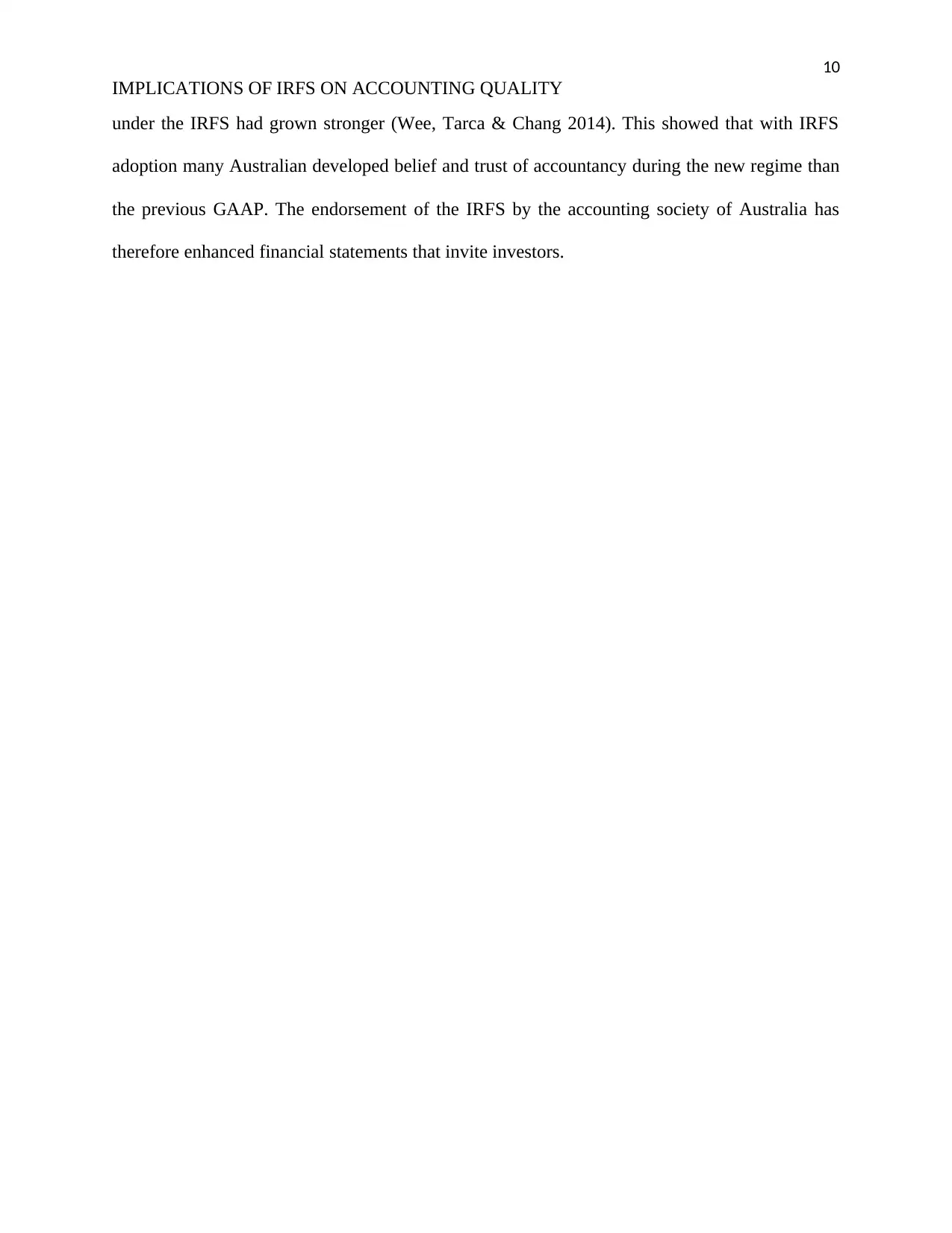
10
IMPLICATIONS OF IRFS ON ACCOUNTING QUALITY
under the IRFS had grown stronger (Wee, Tarca & Chang 2014). This showed that with IRFS
adoption many Australian developed belief and trust of accountancy during the new regime than
the previous GAAP. The endorsement of the IRFS by the accounting society of Australia has
therefore enhanced financial statements that invite investors.
IMPLICATIONS OF IRFS ON ACCOUNTING QUALITY
under the IRFS had grown stronger (Wee, Tarca & Chang 2014). This showed that with IRFS
adoption many Australian developed belief and trust of accountancy during the new regime than
the previous GAAP. The endorsement of the IRFS by the accounting society of Australia has
therefore enhanced financial statements that invite investors.
Paraphrase This Document
Need a fresh take? Get an instant paraphrase of this document with our AI Paraphraser
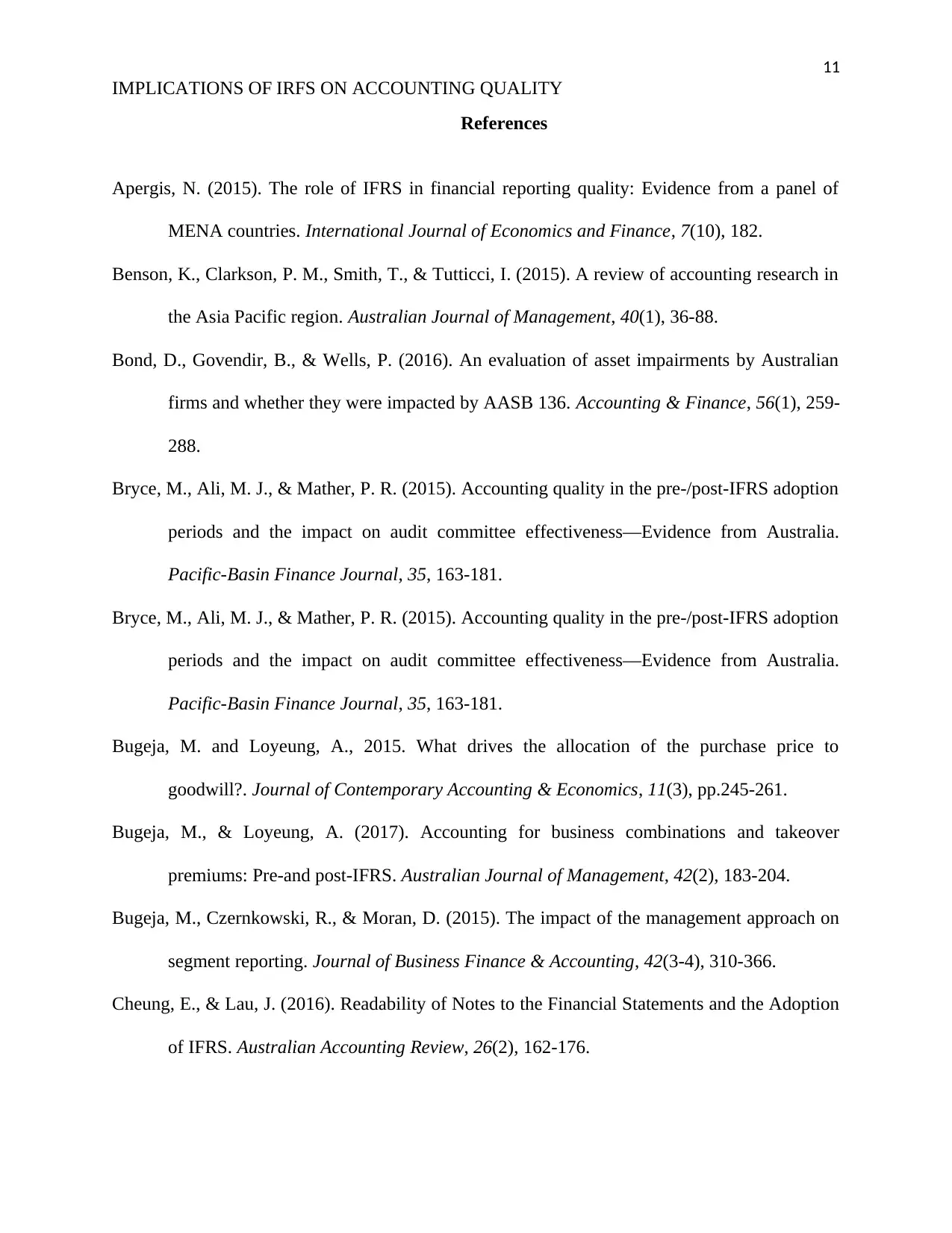
11
IMPLICATIONS OF IRFS ON ACCOUNTING QUALITY
References
Apergis, N. (2015). The role of IFRS in financial reporting quality: Evidence from a panel of
MENA countries. International Journal of Economics and Finance, 7(10), 182.
Benson, K., Clarkson, P. M., Smith, T., & Tutticci, I. (2015). A review of accounting research in
the Asia Pacific region. Australian Journal of Management, 40(1), 36-88.
Bond, D., Govendir, B., & Wells, P. (2016). An evaluation of asset impairments by Australian
firms and whether they were impacted by AASB 136. Accounting & Finance, 56(1), 259-
288.
Bryce, M., Ali, M. J., & Mather, P. R. (2015). Accounting quality in the pre-/post-IFRS adoption
periods and the impact on audit committee effectiveness—Evidence from Australia.
Pacific-Basin Finance Journal, 35, 163-181.
Bryce, M., Ali, M. J., & Mather, P. R. (2015). Accounting quality in the pre-/post-IFRS adoption
periods and the impact on audit committee effectiveness—Evidence from Australia.
Pacific-Basin Finance Journal, 35, 163-181.
Bugeja, M. and Loyeung, A., 2015. What drives the allocation of the purchase price to
goodwill?. Journal of Contemporary Accounting & Economics, 11(3), pp.245-261.
Bugeja, M., & Loyeung, A. (2017). Accounting for business combinations and takeover
premiums: Pre-and post-IFRS. Australian Journal of Management, 42(2), 183-204.
Bugeja, M., Czernkowski, R., & Moran, D. (2015). The impact of the management approach on
segment reporting. Journal of Business Finance & Accounting, 42(3-4), 310-366.
Cheung, E., & Lau, J. (2016). Readability of Notes to the Financial Statements and the Adoption
of IFRS. Australian Accounting Review, 26(2), 162-176.
IMPLICATIONS OF IRFS ON ACCOUNTING QUALITY
References
Apergis, N. (2015). The role of IFRS in financial reporting quality: Evidence from a panel of
MENA countries. International Journal of Economics and Finance, 7(10), 182.
Benson, K., Clarkson, P. M., Smith, T., & Tutticci, I. (2015). A review of accounting research in
the Asia Pacific region. Australian Journal of Management, 40(1), 36-88.
Bond, D., Govendir, B., & Wells, P. (2016). An evaluation of asset impairments by Australian
firms and whether they were impacted by AASB 136. Accounting & Finance, 56(1), 259-
288.
Bryce, M., Ali, M. J., & Mather, P. R. (2015). Accounting quality in the pre-/post-IFRS adoption
periods and the impact on audit committee effectiveness—Evidence from Australia.
Pacific-Basin Finance Journal, 35, 163-181.
Bryce, M., Ali, M. J., & Mather, P. R. (2015). Accounting quality in the pre-/post-IFRS adoption
periods and the impact on audit committee effectiveness—Evidence from Australia.
Pacific-Basin Finance Journal, 35, 163-181.
Bugeja, M. and Loyeung, A., 2015. What drives the allocation of the purchase price to
goodwill?. Journal of Contemporary Accounting & Economics, 11(3), pp.245-261.
Bugeja, M., & Loyeung, A. (2017). Accounting for business combinations and takeover
premiums: Pre-and post-IFRS. Australian Journal of Management, 42(2), 183-204.
Bugeja, M., Czernkowski, R., & Moran, D. (2015). The impact of the management approach on
segment reporting. Journal of Business Finance & Accounting, 42(3-4), 310-366.
Cheung, E., & Lau, J. (2016). Readability of Notes to the Financial Statements and the Adoption
of IFRS. Australian Accounting Review, 26(2), 162-176.
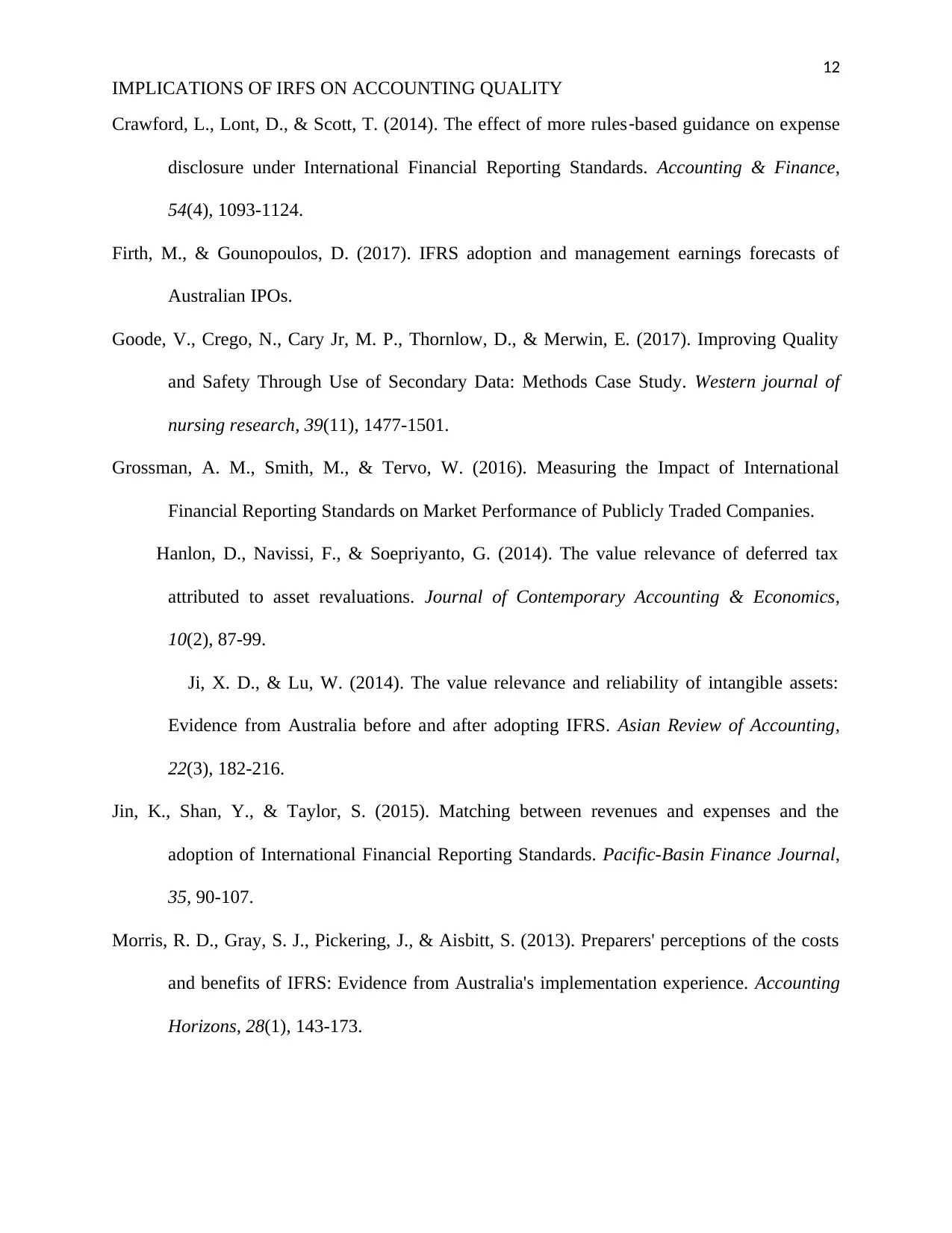
12
IMPLICATIONS OF IRFS ON ACCOUNTING QUALITY
Crawford, L., Lont, D., & Scott, T. (2014). The effect of more rules‐based guidance on expense
disclosure under International Financial Reporting Standards. Accounting & Finance,
54(4), 1093-1124.
Firth, M., & Gounopoulos, D. (2017). IFRS adoption and management earnings forecasts of
Australian IPOs.
Goode, V., Crego, N., Cary Jr, M. P., Thornlow, D., & Merwin, E. (2017). Improving Quality
and Safety Through Use of Secondary Data: Methods Case Study. Western journal of
nursing research, 39(11), 1477-1501.
Grossman, A. M., Smith, M., & Tervo, W. (2016). Measuring the Impact of International
Financial Reporting Standards on Market Performance of Publicly Traded Companies.
Hanlon, D., Navissi, F., & Soepriyanto, G. (2014). The value relevance of deferred tax
attributed to asset revaluations. Journal of Contemporary Accounting & Economics,
10(2), 87-99.
Ji, X. D., & Lu, W. (2014). The value relevance and reliability of intangible assets:
Evidence from Australia before and after adopting IFRS. Asian Review of Accounting,
22(3), 182-216.
Jin, K., Shan, Y., & Taylor, S. (2015). Matching between revenues and expenses and the
adoption of International Financial Reporting Standards. Pacific-Basin Finance Journal,
35, 90-107.
Morris, R. D., Gray, S. J., Pickering, J., & Aisbitt, S. (2013). Preparers' perceptions of the costs
and benefits of IFRS: Evidence from Australia's implementation experience. Accounting
Horizons, 28(1), 143-173.
IMPLICATIONS OF IRFS ON ACCOUNTING QUALITY
Crawford, L., Lont, D., & Scott, T. (2014). The effect of more rules‐based guidance on expense
disclosure under International Financial Reporting Standards. Accounting & Finance,
54(4), 1093-1124.
Firth, M., & Gounopoulos, D. (2017). IFRS adoption and management earnings forecasts of
Australian IPOs.
Goode, V., Crego, N., Cary Jr, M. P., Thornlow, D., & Merwin, E. (2017). Improving Quality
and Safety Through Use of Secondary Data: Methods Case Study. Western journal of
nursing research, 39(11), 1477-1501.
Grossman, A. M., Smith, M., & Tervo, W. (2016). Measuring the Impact of International
Financial Reporting Standards on Market Performance of Publicly Traded Companies.
Hanlon, D., Navissi, F., & Soepriyanto, G. (2014). The value relevance of deferred tax
attributed to asset revaluations. Journal of Contemporary Accounting & Economics,
10(2), 87-99.
Ji, X. D., & Lu, W. (2014). The value relevance and reliability of intangible assets:
Evidence from Australia before and after adopting IFRS. Asian Review of Accounting,
22(3), 182-216.
Jin, K., Shan, Y., & Taylor, S. (2015). Matching between revenues and expenses and the
adoption of International Financial Reporting Standards. Pacific-Basin Finance Journal,
35, 90-107.
Morris, R. D., Gray, S. J., Pickering, J., & Aisbitt, S. (2013). Preparers' perceptions of the costs
and benefits of IFRS: Evidence from Australia's implementation experience. Accounting
Horizons, 28(1), 143-173.
⊘ This is a preview!⊘
Do you want full access?
Subscribe today to unlock all pages.

Trusted by 1+ million students worldwide
1 out of 13
Related Documents
Your All-in-One AI-Powered Toolkit for Academic Success.
+13062052269
info@desklib.com
Available 24*7 on WhatsApp / Email
![[object Object]](/_next/static/media/star-bottom.7253800d.svg)
Unlock your academic potential
Copyright © 2020–2026 A2Z Services. All Rights Reserved. Developed and managed by ZUCOL.





